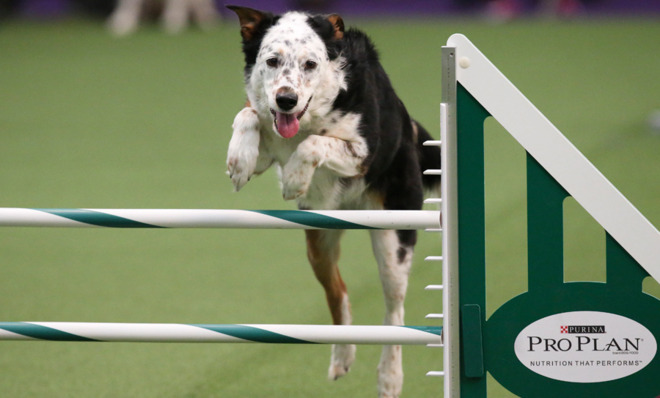Westminster is a disaster for dogs — but it can be fixed
Let's start by ditching its early 20th century understanding of "purity"


A free daily email with the biggest news stories of the day – and the best features from TheWeek.com
You are now subscribed
Your newsletter sign-up was successful
Last night the Westminster Kennel Club crowned Sky, a wire fox terrier, Best in Show. Sky is a sprightly exemplar of his breed and a picture of good health. The same could not be said of all the dogs competing. In fact, many dog breeds need to be saved from the fanciers who love them.
I love watching the dog show. The great variety in the size, shape, and temperament of dogs, from the pipsqueak dignity of a toy Manchester terrier, to the hulking gentility of an Irish wolfhound, is a tribute to the strangely plastic genetics of canines, and to the great creativity of dog breeders throughout history, particularly those in the late 19th and early 20th century.
Unfortunately, the WKC's conformation contest, which is the best promoter of "pedigree" dogs on earth, is unwittingly contributing to their destruction. Because of the Kennel clubs, the entire canine industrial complex is suffused with the worst early 20th century philosophies of good breeding.
The Week
Escape your echo chamber. Get the facts behind the news, plus analysis from multiple perspectives.

Sign up for The Week's Free Newsletters
From our morning news briefing to a weekly Good News Newsletter, get the best of The Week delivered directly to your inbox.
From our morning news briefing to a weekly Good News Newsletter, get the best of The Week delivered directly to your inbox.
At Westminster, as at Crufts (a similar outfit for the U.K.), dogs are judged on their "conformation" to a written breed standard that describes the physical and temperamental features of the ideal dog of that type. These standards sometimes unwittingly encourage the breeding of extremely exaggerated physical features in some dogs. The results can be upsetting: Bulldogs with faces so pressed in they can barely breathe, basset hounds that can hardly walk, cavalier King Charles terriers spaniels who suffer painful fits because their skulls are so small their brains become squeezed, and Irish wolfhounds bred so large their hearts give out after a short life.
Worse, dogs cannot enter dog shows unless they are certifiably "pure" specimens, that is, they were bred from other members of their breed going back as far as the paperwork and bureaucracy care to go. Champion sires at Crufts and Westminster are frequently overbred. This leads to a closed and ever-evaporating gene pool for many breeds. Cancers, hip problems, and skin diseases are too common among "pedigree dogs." Attempts to "breed out" certain cancers within these small genetic pools has thinned the ranks even further.
One is tempted to declare the whole institution and project of pedigree-dog breeding irretrievably corrupt, and walk away. And many have, urging potential dog owners away from breeders (whether responsible or puppy mill) and to the rescue shelter to find delightful and improbable mixes.
But a small revolution occurred in Westminster this year. Following its sister organization Crufts in the U.K., the WKC introduced its own "agility" contest in which dogs run through an obstacle course and try to score the best times. It's a good start since "agility" at least correlates with the health and function of a dog. I attended this contest over the weekend, and it was a delight, far easier to watch than the normal conformation show.
A free daily email with the biggest news stories of the day – and the best features from TheWeek.com
Even if one takes the most uncharitable view and says that WKC has a purely pecuniary motive to assimilate more televisable dog-events into its institutional fold, the fact that it has accepted agility events on their own terms is a sign that the Club's philosophy of "purity" is not totally impregnable. Currently, agility contests are dominated by border collies. But as these contests grow in popularity, they can be restructured to make many other types of dogs competitive.
My own view is that the diversity of dog breeds is a marvel to be preserved where possible. John Bradshaw, writing in the book Dog Sense, says that there is a way to repair the health of pedigree dogs.
The obvious solution, of course, is to open up the closed gene pools of the existing breeds by crossbreeding — merging several breeds into one, or creating new ones by crossing two or more distantly related breeds. Paradoxically, although both of these ideas meet with strong resistance from today's breeders, they were the very mechanisms by which the 19th century dog enthusiasts generated today's breeds! [Dog Sense]
While some breeds may be irretrievably damaged by the last century — English bulldogs, perhaps — most dog breeds can be saved by simple revisions of the breed standard, by creative recombination with other breeds, and by a total relaxation on "purity standard." The very flexibility of dog genes means that it is relatively easy to outcross a member of one breed with another in order to restore health, and within a few generations, breed dogs that conform almost precisely to the original type.
One can even imagine a day where all breeds at Westminster have to pass some basic health and ability tests to qualify for the confirmation ring.
Despite all the tribulations we have inflicted on them, dogs have remained man's best friend. Perhaps it is time to return the favor.
Michael Brendan Dougherty is senior correspondent at TheWeek.com. He is the founder and editor of The Slurve, a newsletter about baseball. His work has appeared in The New York Times Magazine, ESPN Magazine, Slate and The American Conservative.
